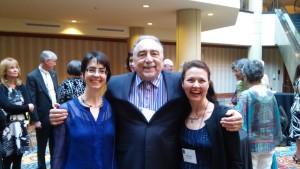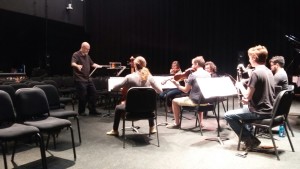I am very pleased to share this interview with my mentor Harvey Sollberger (pictured above, with me and Shannon Wettstein).
EM: How do you know when you are on the right path, doing the music you ought to be doing?
HS: I imagine that people have a lot of different criteria for answering that question. For me, finding the answer to it wasn’t a matter of sitting down and thinking about it. I suppose that it’s the sort of thing that “when you see it, you know it.” Sort of like falling in love. When we fall in love most of us don’t sit down and rationally calculate whether we should or whether it’s convenient or whether this is the right time, etc., etc. (such thinking probably comes later); we’re just, for better or worse, swept away. For me, finding the music that I most loved to play involved a kind of gut recognition. It spoke to me more than other music, it challenged me more and on more levels than other music, and offered correspondingly greater spiritual and existential rewards. It wasn’t an easy road nor was it a commonly-traveled road (at least not in those days). It was just what I felt I had to do if I was to remain a musician.
EM: As a performer and presenter of new music, what are you most satisfied with having accomplished?
HS: Probably my “greatest” accomplishment – if it is an accomplishment and if it is great – was in bringing a new sort of ethic to the performance of contemporary music. The standard for performing challenging new music was very low when I started out in the 1950s and 1960s. The work I did in New York City with my colleagues at the Group for Contemporary Music helped to set new and higher performance standards. It also proved that what some people were calling “impossible” was both playable and transformative in its excitement when performed with careful preparation and full commitment. One example: the composer, Milton Babbitt, wrote his beautiful, Mozartean “Composition for Four Instruments” in 1948. A recording of it was published in 1957; the performers were “big names.” Thing was, they played it loosely and sloppily and it sounded terrible. When my friends and I at the Group performed it in 1963, Milton said, “I’m hearing this piece for the first time. This is how it should sound.” Imagine a composer of the stature of Milton having to wait 15 years to hear a good performance of his music! This is what I dedicated myself to from the beginning, and for me it is a matter of honor, truth, and ethics. If you don’t care enough to dedicate yourself FULLY AND WITHOUT COMPROMISE to performing a piece of music as well as you possibly can, DON’T DO IT. And if you do, WORK YOUR TAIL OFF!
EM: As a composer and performer, how do you see the role of humor in new music? How can it best be used to strengthen rather than undercut the experience of new music?
HS: There is certainly room for humor – whatever that is and however it’s to be achieved – in new music. There’s not one way to go about it, and one size – not even “wan” size – doesn’t fit all. If one’s inclined in that direction, as I sometimes am, the question is how to project it by means of the musical means and language you have at your disposal. It seems to me that regardless of the musical language employed – in other words, this works as much for Stravinsky as for Haydn – humor is often projected through creating expectation in your music and then either delaying the arrival of what’s expected or subverting the expectation completely by presenting – often suddenly – something that’s totally UNEXPECTED. In other words: TIMING. The difference between a successful comedian and one who’s not is often just that, timing. And of course, as performers we have to be sufficiently savvy to understand or intuit what’s going on and make sure it comes off as effectively as possible by means of our timing and musical joke or story-telling skills.
EM: What is the best venue you’ve performed in, and why? What is the worst, and why?
HS: Nice question. I’m inclined to be a little sentimental and say that the best place in which I’ve ever performed was McMillin Theatre at Columbia University in New York City. It’s still there, just called Kathryn Bache Miller Theater now because the money-raising folks at Columbia found out they could sell the name for beaucoup bucks. But it’s still McMillin to me. That’s where we gave our first nine years of Group concerts, 1962-1971. It was a drab, dingy, dusty hall with torn shredded curtains flanking the stage and a poor abused Steinway piano onto which some resourceful graffiti artist had inscribed “PUSSY” with a sharp object. Oh, and the seats were uncomfortable. Edgard Varese came to our concerts at McMillin from the beginning until he died a few years later. He said he liked our concert venue because of (pardon my French) “cette aire de poverte’.
Okay, and what was the worst? Probably the lobby or reception area of the Indianapolis Museum of Art where my Indiana University New Music Ensemble students and I performed one Sunday afternoon in 1986. Not “bad” acoustics; just no acoustics. And the space was full of families loaded down with kids coming in and going out who hadn’t been informed there was a concert going on. You would have had to have the aesthetic of a John Cage to have enjoyed the resultant Klang and Din; and John would probably have enjoyed the crowd noise more than the music. Or maybe not.
EM: If you could tell a classical music lover one thing before a concert, what would it be?
HS: I’d probably tell them to be willing to jettison some of the expectations they have concerning “classical music.” Their background might be useful to them in certain respects, but in others it might put them at a disadvantage. I like to ask people to “clear” their minds and to basically shut-off that little voice in us that’s usually constantly chattering-away as we listen to music (“wow, that was loud, mm, doesn’t the violinist’s arm ever get tired? yipes, wish I’d used the restroom during intermission, etc., etc.”) I’d say something like, “Clear your mind, and let the sounds play on your perception the way the colors and images of a film ‘play’ over the surface of a movie screen; hold-off making comments or value or evaluative judgements for now: just ‘be there’ and take it in. Follow the sound’s behavior: when it scrunches together, when it goes to extremes, when it moves haltingly in fits and starts. Absorb all these things in the way that a reed which pushes through to the surface of a pond is ‘operated’ on by the wind, the water’s motion, a tadpole brushing by, etc. Give yourself over to that experience and see what happens. Nothing is guaranteed because purchasing a ticket to a musical performance is not like buying a mixer at Walmart. It’s a little more like going to your local casino. Bon chance!”
EM: What would you like to see in the culture of American new music to move forward and thrive?
HS: That’s out of my hands now. My gas tank is almost empty. And what do you mean by “move forward and thrive?” In some ways it seems to be doing that more so than at any other time I can remember if you measure moving forward and thriving in terms of the amount of activity going on, the number of people involved, the number of new ensembles on the scene, and an extended aesthetic menu that offers something for everyone. And yet I remember Schoenberg’s dictum: “If it’s art it’s not for everyone; if it’s for everyone it’s not art.” Holy cow, what a snobbishly elitist (shame!) thing to say. And yet, and yet… them’s my roots, gosh darn it. And I must here say a word for what’s not at the center of the “action,” for what’s marginal and liminal, what’s said in a small voice and not through a megaphone. New music’s “salvation” lies not in becoming like rock and roll or in acquiring rock’s “energy” – not my words, other people say things like this and long may they wave it’s sure a free country.
In these my “sunset years,” I find my activities revolving more and more around performing the few very best solo flute pieces I’ve encountered through a lifetime of playing and study (or at least some of them). One of my favorites is called “Ein Hauch von Unzeit I” – which I translate (pardon my German) as “A Breath from What’s Out of Season” – or perhaps the last word of the title should be “Eternity,” I’m not sure. Huber has subtitled the piece as (pardon my French) a “Plainte sur la perte de la reflexion musicale” which he translates as (pardon his English) “a complaint over the loss of musical reflection.” He wrote “Ein Hauch…” in 1972, and I think that there’s even less musical reflection today than there was then. I like the final sentence of his program note for the piece, too: “a piece for patience, for meditation, for freedom from rigidly set schemes.” As new music becomes cool, hip, and popular its overall health and vigor might well benefit from a contemplation of the downside of “being for everyone,” as democratic as that may seem.

